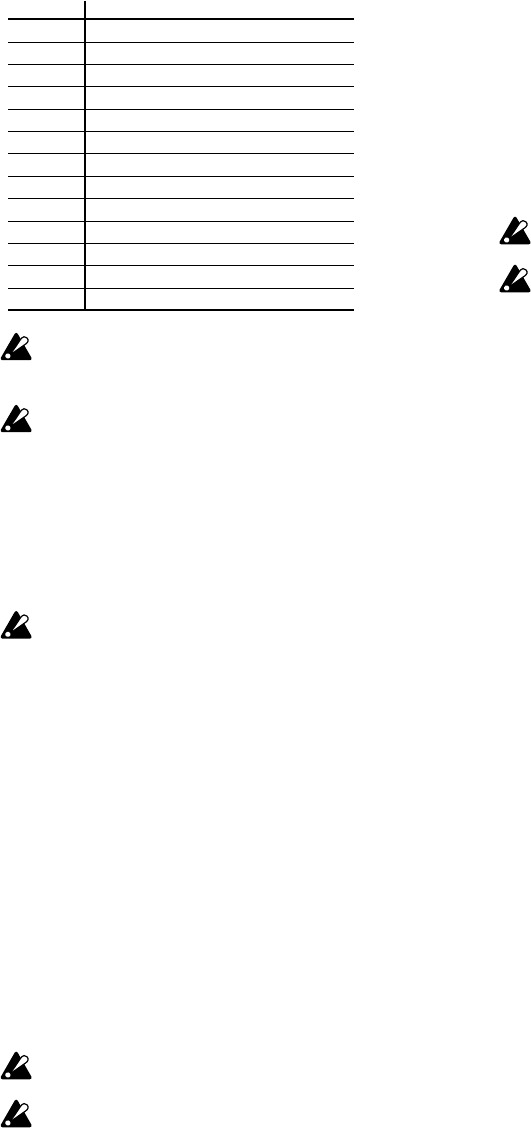
44
FX EDIT1: Speed............................................1...127
Specifies the sampling interval and the sampling time.
The sampling interval is synchronized to the number of
steps in the sequencer. When the BPM changes, the length
per step will also change, so the sampling interval will
change together with this.
The following table shows how the sampling interval cor-
responds with the speed value.
SPEED Sampling interval (number of steps)
0–1 128
2–5 32
6–9 16
10–13 12
14–21 8
22–25 6
26–33 4
34–37 3
38–41 8/3
42–49 2
50–53 4/3
54–83 1
84–127 9/10 ... 1/10 (in 21 steps)
Even if the sampling interval is in the same re-
gion, increasing the SPEED value will shorten the
sampling time.
If the speed is set to a low value and this effect is
played back continuously for an extended time, the
high-frequency portion of the playback will gradu-
ally diminish, causing the tone to become softer.
FX EDIT2: Balance .........................................0...127
Adjusts the balance of the effect sound and direct sound.
Turning the knob toward the right will increase the effect
sound and decrease the direct sound.
If the speed setting is low, the sampling interval
will be long, meaning that if you play the keyboard
etc. manually at a moment in which sampling is
not being performed, you will not hear any sound.
CHO/FLG (Chorus/flanger)
Chorus and flanger are effects that modulate the pitch of a slightly-
delayed sound and add this to the original sound to create a
swirling sensation or a sense of spaciousness.
FX EDIT1: Speed............................................0...127
Adjusts the speed of the chorus/flanger LFO. Turning the
knob toward the right will speed up the LFO.
FX EDIT2: Depth ............................................0...127
Adjusts the depth of the chorus/flanger effect. Turning
the knob toward the right will change the effect from cho-
rus to flanger.
If the depth setting is too high, distortion may oc-
cur for some input sounds.
If you set the speed setting at 0, the LFO will stop
at that position (phase). The position (phase) at
which the LFO stops is not written into the pat-
tern/song data. In addition, the state (phase) of
the LFO is reset when you switch to this effect
from a different effect type. This means that a pat-
tern/song for which you selected this effect, set
the speed to 0, and wrote the settings into memory
may sound differently the next time you select the
pattern/song.
PHASER (Phaser)
This effect creates a sense of modulation by cyclically varying
the phase of the sound and mixing this phase-shifted sound with
the original sound.
FX EDIT1: Speed............................................0...127
Adjusts the speed of the phaser LFO. Turning the knob
toward the right will speed up the LFO.
FX EDIT2: Depth ............................................0...127
Adjusts the depth of the phaser. Turning the knob toward
the right will give the sound a stronger sense of modula-
tion.
If the depth setting is too high, distortion may oc-
cur for some input sounds.
If you set the speed setting at 0, the LFO will stop
at that position (phase). The position (phase) at
which the LFO stops is not written into the pat-
tern/song data. In addition, the state (phase) of
the LFO is reset when you switch to this effect
from a different effect type. This means that a pat-
tern/song for which you selected this effect, set
the speed to 0, and wrote the settings into memory
may sound differently the next time you select the
pattern/song.
RING MOD (Ring modulator)
This effect modulates the sound to give it a metallic character
or turn it into a special-effect.
FX EDIT1: OSCFreq. ......................................0...127
Specifies the frequency used to apply modulation. Turn-
ing the knob toward the right raises the frequency.
FX EDIT2: Balance .........................................0...127
Adjusts the balance between the effect sound and direct
sound. Turning the knob toward the right increases the
effect sound and decreases the direct sound.
TALKING MOD (Talking modulator)
This effect adds vowel formants to the input sound.
FX EDIT1: Formant .........................................0...127
Specifies the formant.
As you turn the knob clockwise from 0 to 127, the formant
will change smoothly between [a]-[e]-[i]-[o]-[u].
FX EDIT2: Offset .......................................... -63...63
Specifies the pitch of the formant frequency.


















